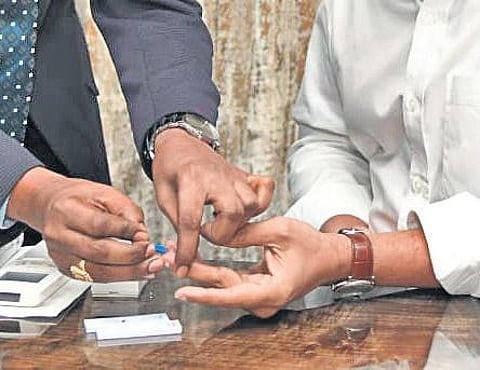

VIJAYAWADA: Amid allegations that the State procured the rapid diagnostic test (RDT) antibody kits for COVID-19 testing at a much higher price compared to other States, the government on Sunday clarified that there were no irregularities or lapses in the procurement of the kits. Deputy Chief Minister and Health Minister Alla Kali Krishna Srinivas, and commissioner of health and family welfare Katamaneni Bhaskar said that the department included a clause in the procurement order that if the kits are supplied at a lower price than the one quoted to the state, the differential amount would be recovered from the company.
“The South Korean firm had a factory in India (Gurugram), but did not have permits to start production the day we placed the order. So, we had no option but to import it from Seoul. A few days after we placed the order, the firm got the requisite permissions to start manufacturing. The Chhattisgarh government ordered from the local firm and hence it got it for a lesser price. Since we knew that the factory was coming up here, we put a clause in the procurement order that the lowest price given to other States would also be applicable to Andhra Pradesh.
So, we will pay whichever is the lowest price: be it Chhattisgarh’s or any others in the future,” Katamaneni Bhaskar explained in a press meet. For the record, the Andhra Pradesh Medical Services and Infrastructure Development Corporation (APMSIDC) had placed the order for two lakh RDT antibody test kits on April 7 for Rs 730 (excluding GST) per kit. On April 17, one lakh RDT antibody kits reached the State from Seoul, South Korea. Commissioner Bhaskar also noted that the Indian Council of Medical Research (ICMR) too placed an order for RDT kits from another firm at Rs 795 per kit.
The furore began a couple of days ago when the Chhattisgarh government stated that it purchased 75,000 RDT kits for Rs 337 (excluding GST) from the same South Korean firm. AP bought kits from SD Biosensor Inc through its authorised seller in India, Sandor Medicaids Pvt Ltd. Deputy CM and Health Minister Alla Kali Krishna Srinivas later released the purchase order, which states, “If any instance comes to the notice that above medical items are supplied at a lower price than the price quoted now, then the differential amount will be recovered from the bills due or any other mode deemed fit.” A letter written by APMSIDC to Sandor Medicaids Pvt Ltd on April 18 has also been released by the government.
In the letter, the corporation, citing the case of Chhattisgarh, requested the firm to explain the reasons for quoting more than it did for other governments. The corporation clarified that only Rs 337 (excluding GST) will be paid as per the conditions in the procurement order. While placing the order, the State government paid 25 per cent of the total order value of Rs 14.6 crore. “We haven’t paid the balance 75 per cent. We will adjust it as per the lowest price and pay,” commissioner Bhaskar clarified.
Community transmission
To a query, if community transmission has begun in hotspots like Vijayawada, Kurnool, and others, the commissioner, in the press meet, said, “If there are cases for which source of transmission can’t be established, it is community transmission. So, you know the answer.” When asked about the presence of such cases, Bhaskar, who took charge as the commissioner on April 1, said, “There are about 40 cases for which we haven’t been able to establish a link. Our team is working on the same.”
He also explained the efforts of the health department to ramp up testing in the State. He said that by next week the department would be able to do 10,000 to 12,000 Reverse Transcription Polymerase Chain Reaction (RT PCR) tests per day as kits are being sources and labs are being fortified.
The RDT antibody test kits are used for screening purposes, while RT PCR tests are confirmatory in nature. “So, we will use rapid kits only for community screening. If the rapid kit test emerges negative, it only means that the person tested doesn’t have an infection at that point in time. Whereas RT PCR tests can show if a person has been infected even if there is no active virus. The RDT kits, however, will ease the pressure on the PCR kits which are limited in supply,” he elaborated.